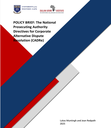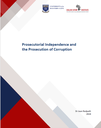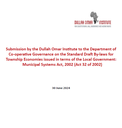This submission by the Dullah Omar Institute critiques the proposed National State Enterprises Bill, arguing that its centralised governance model may deepen existing challenges in South Africa's state-owned enterprises (SOEs). While the Bill rightly aims to strengthen operational efficiency and board accountability, it does so by centralising power in the Presidency through a holding company (SAMSOC), without sufficient checks, transparency, or stakeholder participation. The submission highlights the Bill’s lack of clear criteria for due diligence, accountability mechanisms, or transparent board appointment processes. Drawing comparisons with Singapore’s Temasek model, the Institute argues that transplanting such models without regard to South Africa’s constitutional and political context is misguided. The submission stresses that SOE reform must be rooted in the values of section 195 of the Constitution—particularly transparency, accountability, and public participation. It recommends dispersing decision-making powers, introducing objective and transparent criteria for board appointments, and ensuring meaningful stakeholder inclusion. The current draft, it warns, risks reinforcing oligarchic tendencies and undermining democratic oversight, rather than restoring public trust in SOEs.
The National Prosecuting Authority’s (NPA) Office for Ethics and Accountability (OEA), established in 2023, is a newly created internal mechanism aimed at promoting ethical conduct and accountability among prosecutors in South Africa. Its creation was mandated by the National Prosecuting Authority Act of 1998, but a formal complaints mechanism was only gazetted through regulations in late 2023. The OEA fills a critical gap in the NPA’s accountability framework, especially amid widespread criticism and declining public trust following state capture revelations and systemic inefficiencies in the justice system.
In January 2024 the National Prosecuting Authority (NPA) announced that the German software company SAP would pay restitution of R2.2 billion to South Africa and that the funds would be disbursed to a number of state-owned entities.
This presentation was made at a webinar on Prosecutorial independence & prosecuting corruption on 2 December 2024
This paper argues that the legislation providing for the National Prosecuting Authority (NPA) in South Africa neither encourages independence of the prosecution nor ensures prosecution of corruption. Prepared by Jean Redpath
The right to work in public spaces has recently become a highly contested issue; and the reality in most African countries is that those working in public depend on it for survival. Women make up the majority of workers in the informal economy in Africa and include market and street traders selling small items, food and fresh produce, hawkers, reclaimers and those operating small businesses, such as barbershops and hair salons. This fact sheet highlights the challenges of women working in public spaces in South Africa. The focus is five-fold, namely; (1) general observations on their working conditions, (2) knowledge of the law and policy-making process, (3) engagements between public space workers and sub-national authorities, (4) law enforcement and sanctions, (5) recommendations for reform
Opinion-editorial by Jean Redpath in Daily Maverick, 12 November 2024
This presentation was made at a webinar on “Not my Riot - SAPS, local government and crowd management", hosted by Africa Criminal Justice Reform and African Policing Civilian Oversight Forum on 1 August 2024
This presentation was made at a webinar on “Not my Riot - SAPS, local government and crowd management", hosted by Africa Criminal Justice Reform and African Policing Civilian Oversight Forum on 1 August 2024
Opinion-editorial by Lukas Muntingh in News24, 8 July 2024
This submission was made to the Department of Co-operative Governance on the Standard Draft By-laws for Township Economies issued in terms of the Local Government: Municipal Systems Act, 2002 (Act 32 of 2002) on 30 June 2024 | by Prof Lukas Muntingh, Prof Tinashe Chigwata and Janelle Mangwanda
Opinion-editorial by Jean Redpath in News24, 27 May 2024
Dullah Omar Institute statement on behalf of the Campaign to Decriminalise Poverty and Status in response to the activity report of the Special Rapporteur on Prisons, Conditions of Detention and Policing in Africa. This submission focuses on the challenges related to the criminalisation of minor or petty offences at sub-national level. The submission notes that in several African countries, local law enforcement agencies often enforce subnational laws in an arbitrary, discriminatory and violent way which infringes on fundamental human rights. It was further noted that there is a lack of strong and effective internal and external oversight and monitoring mechanisms to regulate the enforcement practices of subnational law enforcement agencies to protect people against human rights abuses. The submission also highlights the existence in several African states of quasi-state and private security agencies or vigilante groups with delegated powers to prevent crime, maintain public order, police the use of public spaces, and in some cases, effect an arrest. The challenge, however, is that the majority of these security agencies are populated by informally trained personnel and enforcement is conducted in a brutal manner and is often characterized by a lack of due process. In general, the submission recommends that the African Commission and the Special Rapporteur on Prisons, Conditions of Detention and Policing in Africa should urgently prioritise the role of subnational governments in their work to promote the decriminalisation of petty offences.
South Africa has two fully privatised prisons, each housing some 3,000 prisoners. Their history has been mired in controversy from the start, and this has not improved over a period of nearly 25 years. Recent events affecting the security and integrity of the two facilities provide a useful opportunity to reflect on these private prisons as well as wider issues regarding private sector involvement in the prison system. The intersection of politics, organised labour, private sector interests, and corruption have in all likelihood rung the death knell for private prisons in South Africa. Muntingh L, The End of Public/Private Partnership Prisons in the Department of Correctional Services of South Africa, The Prison Journal, 1–17 (2024)
This submission was made by Africa Criminal Justice Reform (ACJR) to the NCOP Select Committee on Security and Justice on the Independent Police Investigative Directorate Bill (B21B – 23) on 1 February 2024
![Submission by the Dullah Omar Institute to the National Assembly Portfolio Committee on Planning, Monitoring and Evaluation on the National State Enterprises Bill [B1 – 2024] Submission by the Dullah Omar Institute to the National Assembly Portfolio Committee on Planning, Monitoring and Evaluation on the National State Enterprises Bill [B1 – 2024]](https://admin.dullahomarinstitute.org.za/acjr/doi-submission-v-6-6-1-2024-a.pdf/@@images/e96335f1-32ac-4b39-a6d0-66b36bf758e3.jpeg)










